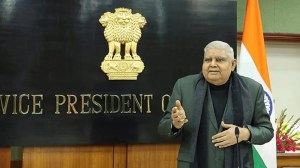5 reasons why Chandigarh is struggling to sell its liquor vends
From high excise fees to fixed quotas, here’s a look at why Chandigarh’s excise policy is failing this year.
 One of the key reasons for Chandigarh's failed excise policy is the negligible excise fee in Punjab. (File photo)
One of the key reasons for Chandigarh's failed excise policy is the negligible excise fee in Punjab. (File photo)The Chandigarh administration is struggling to generate interest in its liquor vends this year and failing to get even half the revenue it earned from the auction of liquor vends last year. The first auction on March 15 saw more than 50 per cent of the liquor vends failing to find any takers, and only 43 out of the 95 vends went under the hammer. On March 21, 11 out of the remaining 52 liquor vends were auctioned.
With the UT administration gearing up to auction the remaining 41 vends on Monday and several officials blaming the Punjab liquor policy for the current situation, here are five reasons why Chandigarh’s ‘not-so-friendly’ excise policy has failed this year:
1. High VAT: Liquor contractors say that a big attraction in Punjab is the negligible value-added tax (VAT) in the state, just 1 per cent of the ex-distillery price or EDP. This means that VAT on a Rs 1,000 bottle is just Rs 100. “Whereas in Chandigarh, they charge 12.5 per cent VAT, a huge difference,” Darshan Singh Kler, who purchased the most expensive liquor vend in Chandigarh, said.
2. Excise fee: One of the key reasons for Chandigarh’s failed excise policy is the negligible excise fee in Punjab. “In Punjab, the excise fee is just 1 per cent while in Chandigarh it ranges between Rs 445 to Rs 3,500 per case, which is a lot more,” Kler added.
3. Fixed quota, penalty on unlifted liquor: Chandigarh has a fixed liquor quota of 18 lakh liquor boxes a year. This means a liquor contractor in Chandigarh will be penalised for unlifted liquor boxes. If the liquor remains unsold, there is a penalty of Rs 900 per case on Indian Made Foreign Liquor; on foreign liquor, the penalty is Rs 3,500 per case within the financial year, contractors said. In contrast, Punjab has an open quota, which means contractors can lift 100 cases or 1,000 cases, with no compulsion.
4. High licence fee: Contractors say Chandigarh has a high licence fee. “In Punjab, it is Rs 1.5 crore to Rs 2 crore, and on an average, in Chandigarh, it is Rs 6 crore,” Kler said. Contractors said that they had pointed this out to the UT administration while the excise policy was being formulated but officials allegedly did not pay heed to their demands.
5. Minimum Retail Price: Liquor is expensive in Chandigarh. Contractors say that if a standard-size Royal Stag bottle costs Rs 300 in Punjab, it costs Rs 500 in Chandigarh. A bottle of beer costs Rs 110 in Chandigarh and Rs 90 in Punjab. Blenders Pride is Rs 740 per bottle in Chandigarh but Rs 650 in Punjab, say contractors. Ironically, before July last year, the MRP in Chandigarh was less than that of Punjab.













